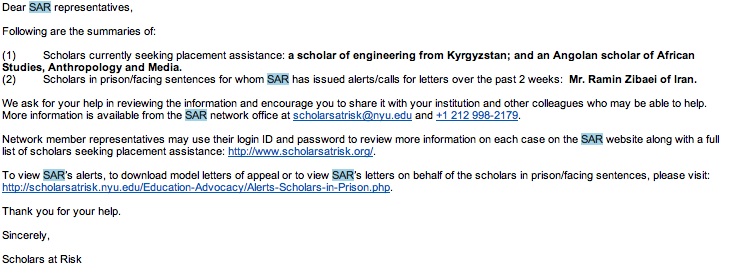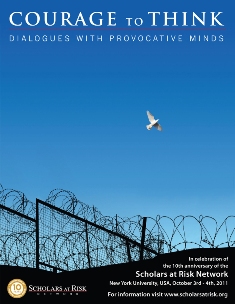Vaclav Havel was buried today. His state funeral in Prague’s main cathedral was attended by the great and mighty. He would have been uncomfortable with the ritual, but have understood the drama of the moment all the same. Outside thousands of Czechs gathered and their faces showed signs of real grief and sadness at the passing of a playwright who fell into the role of president. He wasn’t the architect of 1989 and the collapse of Soviet power in his homeland, and by most accounts he wasn’t a very good president, as his rigid belief structure wasn’t well matched to the quotidian demands of modern politics.
But what Havel will be most remembered for is how he created an intellectual framework for understanding both the specific content of dissent and the role of the dissident in Eastern Europe as well as a way to see beyond prevailing ideologies of the Soviet Bloc and the West to something different, something better. His was a rejection of older revolutionary ideologies and models; it was a new understanding through his own lived experience of the transcendent value of dissent and how it is both a product of the dehumanizing nature of modernization and the last best hope for modern society to resist the forces that would finish robbing it of its last shreds of humanity.
His essay, “The Power of the Powerless” (1978) remains the clearest statement of the role of the dissident, his relationship to power, the arts and humanity. Written as a working paper for a meeting of East Bloc human rights defenders that never took place, the essay has the added virtue of telling us something about what is happening today on the streets of Cairo, where tens of thousands occupied Tahrir Square in protest of the violent crackdown on dissent (and in particular on women protestors), demanding the immediate transition to civil rule. It is also a warning about the moral cost of subordinating human life to ideology and “the cause” – a bloody reminder of which we saw today in an upscale Damascene suburb.
At the center of Havel’s essay is the idea that in a totalitarian-bureaucratic state like his 1970s Czechoslovakia or 2010s Egypt and Syria, truth is a product of power: “The principle involved here is that the center of power is identical with the center of truth.” Thus for the “powerless” their power exists in absenting themselves from the truth produced by the state and, in Havel’s words, “living outside the lie.” He uses a “greengrocer” as an everyman around which to explain the process.
Let us now imagine that one day something in our greengrocer snaps and he stops putting up the slogans merely to ingratiate himself. He stops voting in elections he knows are a farce. He begins to say what he really thinks at political meetings. And he even finds the strength in himself to express solidarity with those whom his conscience commands him to support. In this revolt the greengrocer steps out of living within the lie. He rejects the ritual and breaks the rules of the game. He discovers once more his suppressed identity and dignity. He gives his freedom a concrete significance. His revolt is an attempt to live within the truth.
Those of us who have lived in bureaucratic-totalitarian states like Egypt, Syria and pre-war Iraq know this greengrocer and when his brother and sister Cairenes and Homsis took the streets earlier this year, we saw echoes of Havel’s ideas in what they were doing. It was about breaking the power of fear, but also disconnecting truth from the state in ways Havel, whose own ability to share his ideas was limited by the rules of Samizdat, could have only dreamed of. But he understood the cumulative power of that act.
It is a bacteriological weapon, so to speak, utilized when conditions are ripe by a single civilian to disarm an entire division. This power does not participate in any direct struggle for power; rather, it makes its influence felt in the obscure arena of being itself. The hidden movements it gives rise to there, however, can issue forth (when, where, under what circumstances, and to what extent are difficult to predict) in something visible: a real political act or event, a social movement, a sudden explosion of civil unrest, a sharp conflict inside an apparently monolithic power structure, or simply an irrepressible transformation in the social and intellectual climate. And since all genuine problems and matters of critical importance are hidden beneath a thick crust of lies, it is never quite clear when the proverbial last straw will fall, or what that straw will be. This, too, is why the regime prosecutes, almost as a reflex action preventively, even the most modest attempts to live within the truth.
Even as Havel was describing the power of dissent he was looking beyond it to how making the active choice to live outside of the lie and inside of the truth would form a new basis for society.
Above all, any existential revolution should provide hope of a moral reconstitution of society, which means a radical renewal of the relationship of human beings to what I have called the “human order,” which no political order can replace. A new experience of being, a renewed rootedness in the universe, a newly grasped sense of higher responsibility, a newfound inner relationship to other people and to the human community-these factors clearly indicate the direction in which we must go.
Havel located this “moral reconstitution” in the promise of human rights, taking the existence of rights as a serious starting point for morality in a post-revolutionary system. This is the hard (utopian) part of Havel’s thought. He went from being a dissident to being a politician and every dissident loses some of their charm when this happens. It was not an easy transition for him and suggests how difficult such transitions are. But human rights are not at the center of the moral conversation in Cairo. Havel couldn’t have anticipated how Islamist visions for state and society would come to dominate the aspirational idealism of the post-revolutionary environment there, where another kind of truth, dogma is ascendant. For Havel, “life, in its essence, moves toward plurality, diversity, independent self-constitution, and self-organization, in short, toward the fulfillment of its own freedom,” the politics of the moment in Cairo suggest the opposite a system in Havel’s words, that “demands conformity, uniformity, and discipline” instead.
Yet the bombing in Damascus this morning reminds me that Havel’s theory of the dissident makes it clear that law is at the “innermost structure of the ‘dissident’ attitude. This attitude is and must be fundamentally hostile toward the notion of violent change-simply because it places its faith in violence.” While he does accede to the possibility of violence as a “necessary evil in extreme situations,” he also notes how the dissident is skeptical about any system based on “faith” in change in government or ideological system. What happened in Syria was part of the internationalization of the civil war there and the marginalization of peaceful dissent that advocated for an existential revolution – not just the replacement of one tyranny with another. My thinking is that for Syria, any hope for a peaceful transition is gone.
In the end, the passing of Havel gives us an opportunity to also reflect on the role he believed that art, scholarship and music, especially the raw, malformed rock of the Plastic People of the Universe have, in remaking society.
They may be writers who write as they wish without regard for censorship or official demands and who issue their work-when official publishers refuse to print it-as samizdat. They may be philosophers, historians, sociologists, and all those who practice independent scholarship and, if it is impossible through official or semi-official channels, who also circulate their work in samizdat or who organize private discussions, lectures, and seminars. They may be teachers who privately teach young people things that are kept from them in the state schools; clergymen who either in office or, if they are deprived of their charges, outside it, try to carry on a free religious life; painters, musicians, and singers who practice their work regardless of how it is looked upon by official institutions; everyone who shares this independent culture and helps to spread it; people who, using the means available to them, try to express and defend the actual social interests of workers, to put real meaning back into trade unions or to form independent ones; people who are not afraid to call the attention of officials to cases of injustice and who strive to see that the laws are observed; and the different groups of young people who try to extricate themselves from manipulation and live in their own way, in the spirit of their own hierarchy of values. The list could go on. Very few would think of calling all these people “dissidents.” And yet are not the well-known “dissidents” simply people like them? Are not all these activities in fact what “dissidents” do as well? Do they not produce scholarly work and publish it in samizdat? Do they not write plays and novels and poems? Do they not lecture to students in private “universities”? Do they not struggle against various forms of injustice and attempt to ascertain and express the genuine social interests of various sectors of the population?



